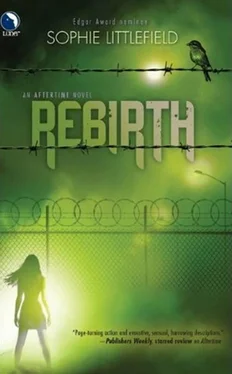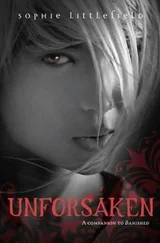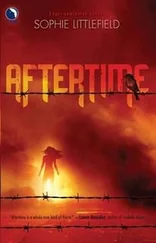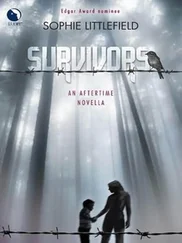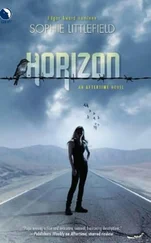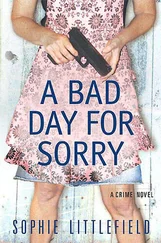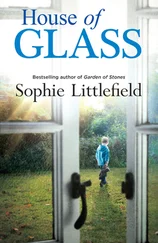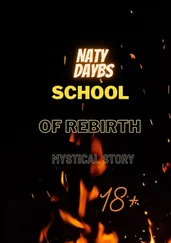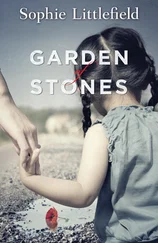She rested her hand on Ruthie’s back and gave herself one last chance to change her mind. Going out into the cold night meant leaving Ruthie here alone with Dor. Ruthie was so small and defenseless and solemn, her childhood like a wilted petal that lay rumpled at her feet-but she was also an outlier. Her small teeth were sharp and white and perfectly formed. Her eyes were clear and bright. Under her soft skin her bones and muscles were strong and getting stronger. Ruthie could run faster, jump farther, climb higher than other children, and if it came down to it, she would survive other hurts better, too-the kind that came from being abandoned over and over by a mother who just couldn’t keep her safe and fulfill her promises to this world.
On the other side of the equation was Smoke. Her lover, the one person on this earth who she had given everything to, the only man besides her father who she had ever trusted-he lay broken and abandoned in the basement of a building far from anything that had ever been home to him. Maybe he was already dead.
Smoke had betrayed her, and his betrayal was a weakness, but perhaps Cass was even weaker than he was because she could not forget him. She could not force herself to rip out the part of her that had been changed by him, could not toughen up the part that had gone soft for him, could not ignore the longing for him that had become as much a part of her as her own name.
She thought she could outrun Smoke by coming to Colima. Now she knew that was never going to be true, not even if he had died that day, if he’d never been brought here, not even if he’d never come back and had forgotten her and gone to live another life. Smoke was imprinted on her and would be a part of her until her own death, whether it was the next hour or whether she lived many more years.
Now Cass had to go to him, knowing she might not return. Danger waited in a dozen, a hundred different forms. She wasn’t afraid of dying-she would die for Ruthie, in agony if that’s what God demanded-but dying for Smoke seemed like an indulgence.
Other mothers would never leave their children’s side. But Cass was not other mothers. She was the one who had traded her baby for a bottle of jack, a jug of pinot grigio, a whiskey and Diet Coke in a plastic cup. She had left her daughter crying in her crib while a stranger tore off her sweater in the next room. The very night that Ruthie had been taken from her, she had sobbed motherly anguish with her face in the carpet only until she found the strength to crawl to the refrigerator and drink every beer she had left.
The shame and regret reached up from the depths and grabbed greedily, ready to call Cass a bad mother, undeserving. But Cass resisted. She had atoned and would keep atoning. Ruthie had spoken Smoke’s name. Ruthie said she must go.
And Ruthie would be safe here. In the other bed was a man who had raised his own daughter, a man who was good with children. You could see it in the way he was with Ruthie-anyone would know that Dor was a natural. When he touched Ruthie she beamed. When he teased her she sparkled with mirth; when he complimented her she swelled with pride.
Cass knew that Dor would lay down his life for Ruthie, likely would for any child. If Cass were to die, Ruthie would learn to love others. She would grow up protected and cherished and if any sane person had to choose between Cass and someone like Dor, the decision would be easy. Nothing personal. Nothing against Cass, who had tried .
So far, trying had not been good enough. Cass had failed the people she loved over and over. But she was about to try harder.
Cass bent to her daughter’s cheek and kissed the damp skin, her lips trembling-but she would not cry.
She gave Dor a long, hard look in the dim light and slipped out of the room.
She heard voices the minute she opened the door of the stairwell, men’s voices, low and punctuated with laughter. Her heart was already pounding, and she paused in the hallway, guiding the door gently shut so that it would make no sound.
Two men sat at a small table, the kind that might have held a drink next to a sofa, back when living rooms were full of things like cocktail parties and hors d’oeuvres and casual conversation and flirting. They had dragged the improbable table between them and set some sort of small, high-tech tripod light on top, illuminating a wooden tray filled with tiny glass pebbles, a game Cass had never seen before.
She slid the heavy overcoat she was wearing off her shoulders, revealing the scoop neckline of her thin nightgown. Her nipples hard from the cold, she had to resist the urge to cover her breasts. Instead she faked a yawn and allowed the coat to slide farther until it covered little more than her forearms and rested, drooping around her waist.
In the past she would never have gone out like this. The nightgown, though snug, wasn’t truly sexy; it squeezed all of her flesh, flattening her roundness, doing nothing for her curves. Also, she was wearing heavy socks and her boots, leaving only the pale flesh of her shins exposed beneath the gown.
Still, this was enough to pass for provocation now. She’d seen it in the library, how small glimpses of flesh-less than graced the naughty stereographs of the 1940s, even-could make a man stutter and swallow hard. If a woman emerged from the bathroom stalls wiping her bare damp forearms on her pants, eyebrows would rise. A woman who brushed her hair in the conference room at night, revealing a triangle of her neck in the light of a candle, this could stop a man.
Cass stood in the circle of light cast by the lamp and pretended to scratch an itch on the top of her thigh. “Excuse me,” she said in a bored voice.
Cass felt that chameleon self coming on. She’d studied hard, and the stakes had been high; life was harder before she learned to interpret and predict the interplay of emotions between her mother and her many lovers, especially once Byrn had taken up residence. She’d built a nearly encyclopedic understanding of what a man’s moods could signal-and from there it had been a simple enough step to copy them herself.
“I’m new,” she continued. “And I’m sorry to bother y’all but I get headaches? And they said something about maybe I could have something for it. Just a Tylenol, one’s all I need.”
She waited, knowing the timing was important; the men glanced at each other skeptically but were barely able to tear their eyes from her body. One of the men was tall and stocky, red-haired with a sharp cleft to his chin, his face all harsh planes. The other had a thick, gray-peppered moustache and a ring of longish hair around his bald spot. While Cass watched, he shoved his hand through his hair in a vain attempt to force the hair across his head, and Cass felt a wave of revulsion. Mim once had a boyfriend who spent fifteen minutes at the mirror every morning arranging and spraying his thin strands of hair on top of his head. He was an unusually strong perspirer, and within an hour the fabric of his shirt would be ringed with sweat under the armpits and his bald head would shine.
He was hardly the worst of Mim’s boyfriends, though.
When her gaze fell on the red-haired man’s wrist and she saw the koru mark there, she relaxed a little. So it would be him. That would be better. There would be no painful memories complicating what was already an odious task.
“Girly, ain’t you heard, the drugstore’s closed, ” the mustached man said, drawing the last syllable out and staring unabashedly at her chest.
“Oh, I’m sorry, I thought it was different for outliers,” Cass said, flipping her hair over her shoulder. “That’s what they told me, anyway.”
“Hang on.” The red-haired man’s voice was sharp, inflected with some sort of northern accent, Canadian or Wisconsin or something. “You’re an outlier?”
Читать дальше
Конец ознакомительного отрывка
Купить книгу
